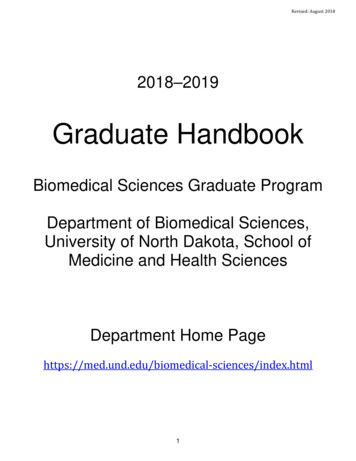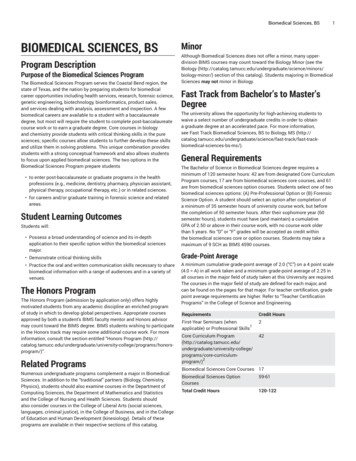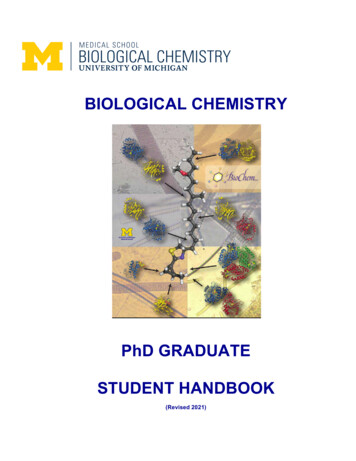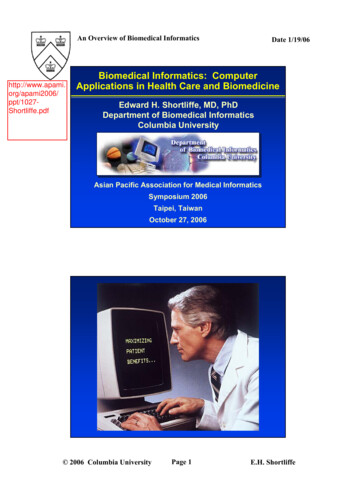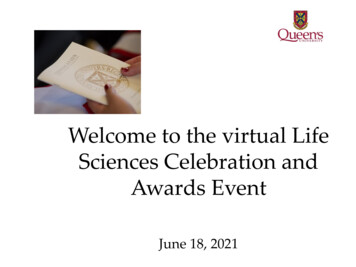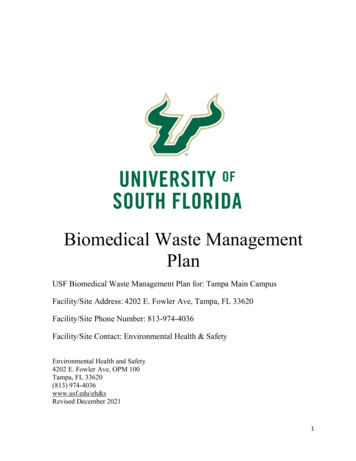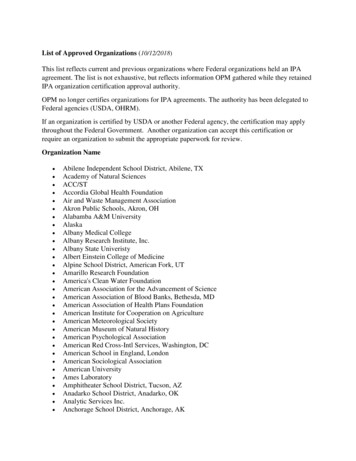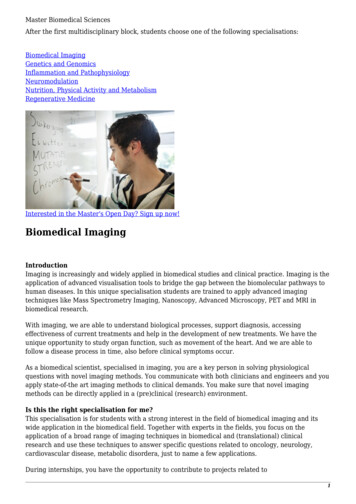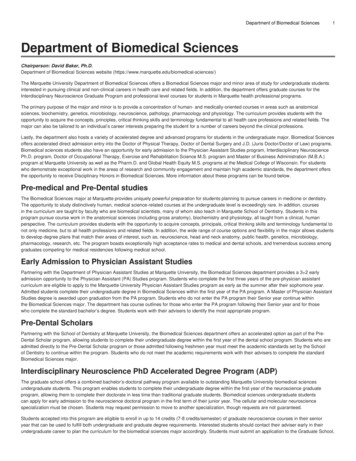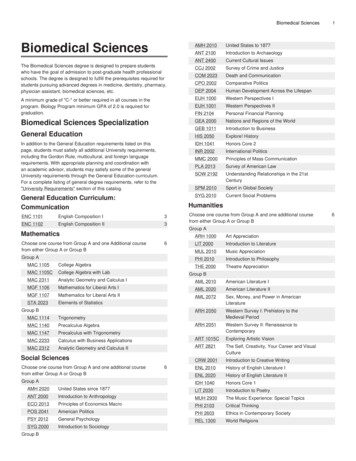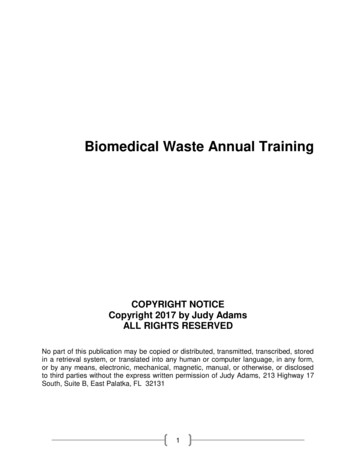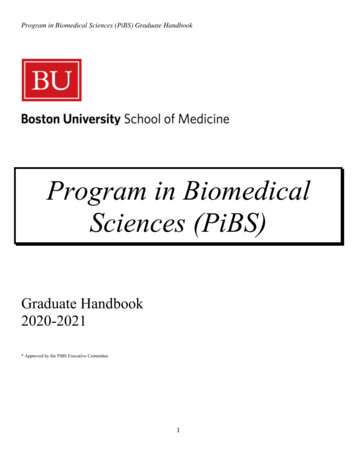
Transcription
Program in Biomedical Sciences (PiBS) Graduate HandbookProgram in BiomedicalSciences (PiBS)Graduate Handbook2020-2021* Approved by the PiBS Executive Committee1
Program in Biomedical Sciences (PiBS) Graduate HandbookCONTENTSSECTIONPAGE1. Welcome2. Title IX & BU Policies3. PiBS Governance4. Academic Advisors5. Academic Requirements6. Rotations7. Dissertation Advisor Assignment8. Qualifying Examinations9. Dissertation and GraduationAppendicesAppendix #1: PiBS Required ClassesAppendix #2: PiBS Elective ClassesAppendix #3: PiBS Rotation Evaluation Form3344467778911152
Program in Biomedical Sciences (PiBS) Graduate Handbook1.WelcomeWelcome to the Program in Biomedical Sciences (PiBS). We’re pleased to have you join PiBS, which is a Ph.D.program within the Division of Graduate Medical Sciences (GMS) at Boston University School of Medicine.This umbrella program embodies 10 participating departments and programs within GMS (Departments ofBiochemistry, Biophysics, Microbiology, Pathology, Physiology, Programs in Genetics & Genomics, Molecular& Translational Medicine, Nutrition & Metabolism, Oral Biology and Immunology Training Program). Studentsfulfill requirements of PiBS and upon choosing a dissertation laboratory and a department/program affiliation,requirements of the department/program are fulfilled as well.This guide is intended to provide graduate students (as well as faculty members) within PiBS with a descriptionof the policies and requirements of the graduate program. This guide was prepared to assist students in progressingthrough the program. This handbook is intended only to describe general PiBS requirements/policies, not thoseof the individual participating departments/programs i.e. as mentioned above, students are required to completeboth PiBS as well as the department/program-specific requirements. As program policies and requirements maychange, students are advised to consult with their advisors during the first year in the PiBS program and then withtheir dissertation advisors and the Directors of Graduate Studies of the departments/programs they join uponchoosing a dissertation laboratory (see below for more information about this process). To be certain that theyare in compliance with all policies and requirements, students must also adhere to the guidelines of GMS atBoston University School of Medicine, as well as Boston University at large, and they are advised to consultrelevant administrative personnel for further information regarding graduate study at Boston University. It iseach student's responsibility to be certain that all program requirements are fulfilled. The student is encouragedto consult regularly with his/her advisor to be certain that he/she is progressing as expected and that allrequirements will be completed in time for the student’s planned graduation.2. Title IX & BU Policies“Title IX of the Education Amendments of 1972 is a federal civil rights law that prohibits sex-baseddiscrimination in federally funded education programs and activities. Sex-based discrimination includes sexualharassment and sexual violence, such as rape, sexual assault, sexual battery, and sexual coercion. The law coverssex-based discrimination against students, faculty, and staff.To ensure compliance with Title IX, Boston University has appointed a University Title IX Coordinator as wellas deputy coordinators for key offices and within all schools. The Deputy Title IX Coordinators for BostonUniversity School of Medicine (BUSM) are:1) Gwynneth Offner, Ph.D., Director, M.A. Medical Sciences Program (GMS)goffner@bu.edu / (617) 358-95412) Karen Symes, Ph.D., Assistant Dean of Student Affairs (MED)symes@bu.edu / (617) 358-4578For more information, including BU Title IX contacts, BU’s responsibilities under Title IX and disciplinaryprocedures, go e-ix-bu-policies/3
Program in Biomedical Sciences (PiBS) Graduate Handbook3.PiBS GovernanceThe program is designed with a shared-governance philosophy that draws on faculty from all participatingdepartments and programs. Included in the governance structure are the Program Director, the ExecutiveCommittee, the Admissions Committee, the Advising Committee and the Steering Committee. All worktogether to ensure that the program runs smoothly on a day to day basis, that new students are recruitedannually, that students are properly guided through the program, that student progress is assessed, that newideas are considered and new policies and initiatives disseminated to the home departments/programs and thatthe Associate Dean of GMS is kept abreast of program progress. This PiBS governance structure is designed toensure that all ten programs have representation and that open communication between the leadership, thefaculty and the students is in place.4.Academic AdvisorsEach student is assigned a faculty member as academic advisor upon entering the PiBS graduate program. Theacademic advisor functions as the student’s formal administrative advisor until a permanent research advisor isassigned (at the end of the first academic year). The role of the academic advisor is to provide assistance andadvice on all academic issues. The advisors are members of the PiBS Advising Committee.5.Academic RequirementsThe PiBS Ph.D. program requires 64 credits. Some of these credits are taken as formal didactic courses and theremainder are earned by performing research and/or attending and actively participating in department/programrelated activities e.g. seminars. PiBS required courses for students entering the program in 2020 are outlinedbelow (Table I). In addition, students choose elective coursework.Table I. PiBS COURSE REQUIREMENTSSemesterFallCore courses(16 11 Foundations in Biomedical Sciences: Protein3Structure, Catalysis and InteractionFC712 Foundations in Biomedical Sciences: Structure3and Function of the GenomeFC764 Professional Skills2FC713 Foundations in Biomedical Sciences:3Architecture and Dynamics of the CellFC714 Foundations in Biomedical Sciences:3Mechanisms of Cell Communication2FC708 Professional Development SkillsIn addition to the specific courses listed above, all PiBS students must take a statistics class; for some PiBSaffiliated programs, there is a specific course that is required while for other programs, students can choose froma variety of courses offered.It is important to note that the PiBS coursework and rotations do not adhere to the posted Boston Universityschedule. See Table II for the dates classes start and the last dates for administration of final examinations (askprofessors of each class for specific final examination dates). The dates for the laboratory rotations are listed inthe section on rotations below.4
Program in Biomedical Sciences (PiBS) Graduate HandbookTable II. PiBS DATES TO REMEMBEREventDateOrientationAugust 31, 2020Fall semester startsSeptember 2, 2020*Fall semester final exams endDecember 19, 2020(Boston University calendar)*Spring semester classes startJanuary 25, 2021(Boston University calendar)*Spring semester final examsMay 8, 2021end(Boston University calendar)*Note that not all GMS classes adhere to the Boston University calendar so besure to check with course directors for information on courses you plan to take.During the first year in the program, it is expected that students will register for up to 12 didactic course creditsper semester. This will consist of the PiBS required courses listed in Table I (see Appendix #1 for coursedescriptions) as well as elective courses (see Appendix #2 for course descriptions). The latter are chosen inconsultation with the advisor and may focus on a known area of interest or to explore a new area (which westrongly encourage)!Once a student chooses a dissertation laboratory and a department/program of study, additional coursework willbe dictated by the requirements of that department/program. All departments/programs require that the studentsubmit, present and defend a dissertation based on original laboratory research performed under the direction ofa member of the PiBS faculty (the faculty member must have a faculty appointment to one of the participatingdepartments or programs as well as an appointment to the GMS faculty).All graduate students are also required to attend Boston University’s Program in Responsible Conduct ofResearch. See details at: onsible-conduct-of-research/.GradesGMS uses the following system of letter grades for evaluation.A to BPass with creditC or below Considered failure; no credit grantedPPass with credit; directed study, research courses at the 900 level as well as other coursesdeemed Pass/FailFFail; directed study, research courses at the 900 level as well as other courses deemed Pass/FailIIncomplete, with additional work requiredXUnresolved statusJRegistration in same or continuing course in the following semester necessary (excludingsummers)AUAudit, no creditNNo credit granted toward a graduate degreeWWithdrew after grace periodMGMissing grade, grade not assigned5
Program in Biomedical Sciences (PiBS) Graduate HandbookIncomplete Coursework and Failing GradesWhen the work of a course has not been completed within the semester of registration, the grade of I isassigned. This automatically becomes an F unless coursework is completed within a specific timeframe to bedetermined in consultation with the course manager; this timeframe cannot exceed 1 year (12 months) from thetime the grade of I is assigned. Grades of I or C or lower are interpreted as failures. A student receiving suchgrades in total of 8 credit hours is terminated. A student receiving a failing grade will not be permitted to take amake-up examination. Grades of C or lower must be remediated in required PiBS courses.Additional Requirements and GuidelinesPiBS students are required to maintain a minimum cumulative grade point average (GPA) of B (3.0) or better intheir courses. Students must maintain this GPA throughout their matriculation in graduate school; this includesthe first year as well as subsequent years when the student joins a specific PiBS-affiliated program based on thechoice of dissertation advisor. Students who fail to maintain a 3.0 grade point average will be placed on academicprobation. The student has one year to remediate the deficiency and bring the total GPA to 3.0. If this is notachieved, the student will be dismissed from the program. Students on academic probation are not allowed to takeQualifying or Dissertation Defense examinations. Financial assistance is dependent upon the student remainingin good standing within the program.All students are required to complete three laboratory rotations prior to choosing a laboratory in which to performthe dissertation research work. Students must be accepted into a dissertation lab and a department or program byJune 30th of the first year in the program. Students who fail to do so will be dismissed from the program.All students are required to be registered every semester at Boston University unless on an approved leave ofabsence as per GMS and University guidelines. Prior to assignment of a dissertation advisor, students’ leavepolicies are dictated by the schedule of classes and rotations.It is expected that all students conduct themselves in a professional manner. Prompt attendance is expected at alllectures and other events as arriving late is disruptive to others. Cell phones must be turned off and put awaywhile in class. The opinions of all others (students, staff and faculty) should be respected. Criticism of differentopinions is embraced but should be delivered in a caring and constructive manner.Any accusations of academic misconduct will be subject to deliberation and potential sanctions as dictated by theGMS Academic Conduct Code and Disciplinary Procedures.6.RotationsExperience in a range of laboratory research environments is an essential part of a graduate student’s education.Thus, the process of having students rotate through several laboratories is an integral part of PiBS. Rotationsexpose students to a range of techniques and approaches used within the various biomedical science disciplines.The rotations also serve to allow students the opportunity to get a first hand view of laboratories in which theymight eventually conduct their dissertation research.Students are expected to complete three laboratory rotations (two in the fall semester and one in the springsemester). The rotation dates for the fall semester are listed below (Table III). Students may petition to conductone additional rotation after the third rotation (with approval of the Executive Committee). The faculty membershosting rotation students should be selected from the list of laboratories that have available positions for newstudents. No lab will host more than two PiBS students at any given time.6
Program in Biomedical Sciences (PiBS) Graduate HandbookTable III. PiBS ROTATION DATESRotationStart date#1Sept. 21, 2020#2Nov. 2, 2020#3Feb. 8, 2021End dateOct.30, 2020Dec. 18, 2020Mar. 12, 2021The student is expected to spend 15-20 hours per week in the rotation labs, including attending laboratorymeetings whenever possible. During the rotations, it is expected that students will participate in a research projectand will keep proper documentation consistent with the policies of the host laboratory. Students may be asked topresent the results of their rotation work to the laboratory group at the end of the rotation period. In addition,students will be expected to give a presentation to the PiBS community that will be planned at the end of eachrotation. After the completion of each rotation, the faculty will evaluate, in writing, the student’s performanceduring the lab rotation (see Appendix #3). The faculty member is expected to go over the evaluation with thestudent prior to submitting it to the Advising Committee. The Rotation Evaluation report will become part of thestudent’s permanent record. In addition, it will contribute to the final grade for the student’s “research” credits(FC951, FC952) during the semester(s) in which the rotations are performed.7.Dissertation Advisor AssignmentThe final assignment will be determined by the student, dissertation mentor and the director/chair of thesponsoring program or department.8.Qualifying ExaminationsAll students must pass a written and oral qualifying examination. The qualifying examinations are designed andadministered by the participating departments/programs which dictate the academic standards for allowing astudent to take these exams.9.Dissertation and GraduationOnce students pass their qualifying exams, an advisory committee will be assembled as per the guidelines of eachdepartment/program. The roles of the dissertation advisory committees are to both advise students and assesstheir progress throughout the dissertation research portion of the Ph.D. program. Expectations for the dissertationare dictated by each department/program in keeping with GMS guidelines.7
Program in Biomedical Sciences (PiBS) Graduate HandbookAppendices8
Program in Biomedical Sciences (PiBS) Graduate HandbookAppendix #1PROGRAM IN BIOMEDICAL SCIENCES (PiBS)REQUIRED CLASSESFall semesterGMS FC 711 Foundations in Biomedical Sciences I: Protein Structure, Catalysis and InteractionThe first module of the Foundations in Biomedical Science course "Protein structure, catalysis and interactions"will provide students with a quantitative understanding of protein structure, function, posttranslationalmodification and the turnover of proteins in the cell. In addition, students will gain facility with thermodynamics,catalysis, kinetics and binding equilibria as they apply to proteins and also to other molecules in biological systems(e.g. nucleic acids, lipids, vitamins, etc.). This course is part of a series of four core integrated courses andadditional elective courses aimed towards first year Ph.D. students in Graduate Medical Sciences. The four coreswill be integrated in content and structure, and therefore are intended to be taken as a complete, progressivesequence. McKnight, Zaia. 3 cr, Fall sem. Sept. 3-Oct. 16; Tue, Thu, Fri 10:00am-11:50am.GMS FC 712 Foundations in Biomedical Sciences II: Structure and Function of the GenomeThe second module of the Foundations in Biomedical Sciences course will focus on the mechanisms of biologicalprocesses that influence the inheritance, regulation, and utilization of genes. Genetic and genomic, molecular, cellbiological, and biochemical experimental approaches to understanding these processes will be explored. Inaddition, we will discuss the possibilities of utilizing these technologies in medical treatments. This course is partof a series of four core integrated courses and additional elective courses aimed towards first year Ph.D. studentsin Graduate Medical Sciences. The four cores will be integrated in content and structure, and therefore areintended to be taken as a complete, progressive sequence. Dasgupta. 3 cr, Fall sem. Oct. 20-Dec. 15; Tue, Thu,Fri 10:00am-11:50am.GMS FC 764 Professional SkillsThe goal of this course is to develop skills in writing and oral presentations that students need for their professionallives. Students will be exposed to different forms of oral presentations and give weekly talks. Sessions are highlyinteractive. Gabel. 2 cr, Fall sem. Mon 10:00am-11:50am.9
Program in Biomedical Sciences (PiBS) Graduate HandbookSpring semesterGMS FC 713 Foundations in Biomedical Sciences III: Architecture & Dynamics of the CellThe third module of the Foundations in Biomedical Sciences course will focus on the movement of proteins andmembranes with the cell, the secretory process, the cytoskeletal framework of the cell and the resulting cell-cellinteraction and communication with the matrix. Molecular, cell biological, and biochemical experimentalapproaches to understanding these processes will be explored. In addition, we will discuss the possibilities ofutilizing these technologies in medical treatments. This course is part of a series of four core integrated coursesand additional elective courses aimed to-wards first year Ph.D. students in Graduate Medical Science. The fourcores will be integrated in content and structure, and therefore are intended to be taken as a complete,progressive sequence. Trinkaus-Randall, Zoeller. 3 cr, Spring sem. Jan. 19-Mar. 5; Tue, Thu, Fri 10:00am11:50am.GMS FC 714 Foundations in Biomedical Sciences IV: Mechanisms of Cell CommunicationThe fourth module of the Foundations in Biomedical Sciences course will focus on the mechanisms of cellcommunication. This module will begin by discussing overarching concepts before examining the specific typesof molecules that initiate and transduce signals. Examples of cell signaling and subsequent cellular responses willthen be considered in different contexts to provide a framework on which future learning can be applied. As themodule progresses, the complexity of the systems explored will increase from individual cells to multicellularenvironments such as tissues, organs, and organisms. In addition, normal processes as well as the dysregulationof cell-cell communication is disease will be studied. This course is part of a series of four core integrated coursesand additional elective courses aimed towards first year Ph.D. students in Graduate Medical Sciences. The fourcores will be integrated in content and structure, and therefore are intended to be taken as a complete progressivesequence. Symes. 3 cr, Spring sem. Mar. 16-Apr. 30; Tue, Thu, Fri 10:00am-11:50am.GMS FC 708 Professional Development SkillsThis course proposes to extend the students' education beyond the traditional biomedical course content. Today'sworld of science is complex and today's student is faced with a wide variety of options to consider. The coursebegins to expose students to basic skills that all scientists must master (e.g. presentation skills), to issues ofcompliance/ethics & the law as well as to their personal professional development, the latter highlighted bystudents' working on an individual development plan by participating in the “myIDP” project. The course drawson a wide variety of experts throughout the university. Schreiber. 2 cr, Spring sem. Wed 10:00am-11:50am.10
Program in Biomedical Sciences (PiBS) Graduate HandbookAppendix #2PROGRAM IN BIOMEDICAL SCIENCES (PiBS)ELECTIVE CLASSESNote that some elective classes require that a certain number ofstudents enroll for the course to be taught.The following classes are offered as electives during the first year in PiBS. Not all of the classes are offered everyyear and might depend upon enrollment. Some of the classes may be requirements for some of the participatingdepartments/programs. Each department/program has designed a curriculum that will allow students who enterthe program at the end of the first year in PiBS to complete these requirements after acceptance into a dissertationlab and department or program i.e. the choice of department or program isn’t dictated by the program-specificrequirements fulfilled during the first year.Fall semesterGMS BI 777 Techniques in Biomedical ResearchThis course will complement the Foundations in Biomedical Sciences PhD curriculum and focus on bothfundamental and advanced experimental approaches employed in biomedical research laboratories. Specifictopics covered in include: scientific and experimental design, cell culture/gene transfer, protein isolation andanalysis, DNA and cloning, PCR/CRISPR technologies, DNA-protein interactions & chromatin, quantitativePCR, lipids, transgenic and knockout mice, mass spectrometry and applications, flow cytometry, microarray &next generation sequencing, and histology/confocal microscopy. Layne. 2 cr, Fall sem. Wed 9:00am-10:50am.GMS BY 762 Foundations of Biophysics and Structural Biology IThis graduate level course provides a thorough grounding in the theory and major experimental methods ofBiophysics and Structural Biology. The course covers x-ray diffraction, crystallography, electron microscopyand image processing. Atkinson. 2 cr, Fall sem. Mon 1:00pm-2:50pm.GMS BY 776 Macromolecular Assemblies IThis graduate level course covers the concepts of the assembly of biomacromolecules, their structure andstabilizing forces, and biological function as related to structure. Examples are drawn from protein and proteinnucleic acid assemblies, and membrane proteins. Shipley. 2 cr, Fall sem. Wed 1:00pm-2:50pm.GMS GE 701 Principles of Genetics and GenomicsThis course will serve as a foundation for understanding the heritable basis of numerous biological traits, therelationships among genes, and the regulation of their expression. Focus on the ability to use genetic systems toprobe these problems, and therefore will heavily explore the experimental aspects of these investigations. Includesdiscussion of the impact of the genome sequences' availability on the practice of modern science. Use of casestudy approach to investigate the rich variety of scientific insights gained through genetic studies of cell-cellcommunication, aging, addiction, obesity, and others. Dasgupta. 4 cr, Fall sem. Tue, Thu 1:00pm-2:50pm.11
Program in Biomedical Sciences (PiBS) Graduate HandbookGMS MI 713 Comprehensive ImmunologyComprehensive introduction to immunologic principles and application to current problems. This courseconsists of both interactive lectures and discussion sessions often involving contemporary literature. Emphasisis placed on the integration of innate and adaptive immune systems. While formal prior immunology training isnot required, a sound basis in genetics and biochemistry is strongly recommended. Browning. 4 cr, Fall sem.Mon, Wed 4:00pm-5:50pm.GMS MM703 Cancer Biology and GeneticsThis course will cover topics in human tumor biology including: Tumor progression, invasion, and metastasis;Viruses, immunodeficiency, and cancer; Chemical carcinogenesis; Signal transduction; Anti-oncogenes andfamilial cancer syndromes; Apoptosis and cancer; Cell cycle control; DNA repair; Principles of CancerTherapy; Immunotherapy of Cancer; Anti-angiogenesis therapy; and modern molecular diagnostic techniques.Flynn, Ganem. 2 cr, Fall sem. Wed 10:00am-11:50am.GMS MM725 Biology of the Lung and Pulmonary DiseaseThis course will cover topics in basic lung biology including cellular components and functions in therespiratory system and how the processes of immunity and development influence lung structure and function.The course will apply this basic biology to cutting edge developments in pulmonary diseases including the acuterespiratory distress syndrome, pneumonia, asthma, pulmonary hypertension, pulmonary fibrosis, chronicobstructive pulmonary disease and lung cancer. Mizgerd, Quinton. 2 cr, Fall sem. Wed 1:00pm-2:50pm.GMS OB 763 Basic Processes in Oral BiologyThis course examines biological processes at the cellular and molecular levels. Provides a basis to understand theevents that regulate inflammation; wound healing; bone formation and resorption; salivary proteins, the relevanceto mineral homeostasis and anti-microbial activity; tooth development, eruption, and movement; and oral immunesystem and oral immunology protective and destructive aspects of oral tissues. Mochida. 2 cr, Fall sem. (followedby the 2 cr, Spring sem. class; OB 764) Mon 5:30pm-7:20pm.12
Program in Biomedical Sciences (PiBS) Graduate HandbookSpring semesterGMS BY 763 Foundations of Biophysics and Structural Biology IIThis graduate level course provides a thorough grounding in the theory and major experimental methods ofBiophysics and Structural Biology. The course covers thermodynamic and spectroscopic methods, computationalbiology and structural NMR. Atkinson. 2 cr, Spring sem. Mon 1:00pm-2:50pm.GMS BY 777 Macromolecular Assemblies IIThis graduate level course covers the concepts of the assembly of biomacromolecules, their structure andstabilizing forces, and biological function as related to structure. Examples are drawn from assemblies oflipoproteins, phospholipids, and membrane proteins. Shipley. 2 cr, Spring sem. Wed 1:00pm-2:50pm.GMS FC 706 Molecular MetabolismPrereq: consent of instructor. This optional module of the Foundations in Biomedical Sciences curriculum focuseson the biochemical, cellular and molecular mechanisms that regulate cell and tissue-specific fuel metabolism.The course will present an integrated view of biochemistry and the control of cellular and organismal functionswith regard to nutrient utilization. Classes include small group discussions of key papers. Mechanisms that allowcells to survive variations in nutrient supply (starvation, feeding, nutrient excess/stress) and how thesemechanisms contribute to metabolic derangements contribute to disease pathogenesis (e.g. diabetes, obesity,cancer) will be discussed. This class is taught in conjunction with NU756; students registered for FC706participate in a portion of the lectures. Deeney. 2 cr, Spring sem. Tue, Thu 4:00pm-5:50pm (likely time).GMS FC 715 Translational Genetics and GenomicsModern human genetics has evolved at a tremendous pace, with the promise of an affordable complete genomesequence for every individual just around the corner. While the raw information has increased exponentially, itstranslation to patient care has not kept pace. We will discuss exciting recent advances in human genetics andgenomics, with illustrative examples of their translation into improvements in diagnosis and treatment of patients.We will also discuss ethical and societal challenges of this rapidly evolving field. Our course is aimed at first orsecond year Ph.D. students, and will be taught by faculty in a variety of departments through traditional lecturesand discussion sections. Students will be evaluated on their ability to explain the translational research processand demonstrate how individual research findings build on one another to move a field forward to ultimatelyimpact patient care. 3 cr, Spring sem.GMS FC 717 Physiology of Specialized CellsPrereq: consent of instructor. This course is one of the elective course modules (Module V) of the Foundationsin Biomedical Sciences curriculum. Knowledge of cellular and molecular physiology is critical to understandingthe higher order of functioning of tissues, organs, and organs systems. The objective of the course is to discussthe specialized adaptations of cells that help them to function in their respective tissues and organs. This coursewill also provide a framework to bridge the gap between the biochemistry and the molecular and cellular biologythat students have acquired in the core modules (I through IV) and organ physiology and pharmacology that willbe addressed in the second year. Gabel. 3 cr, Spring sem.GMS FC 762 Critical Thinking in Cell and Molecular BiologyPrereq: consent of instructor. The primary goal of this course is to use the framework of the scientific literatureto develop Critical Thinking Skills to generate novel hypotheses with a focus on establishing novel biologicalmechanisms and pathways. Critical Thinking skills will be used to examine research findings and theories to13
Program in Biomedical Sciences (PiBS) Graduate Handbookuncover inconsistencies, bias, or faulty logic. The student will be expected to build on their careful evaluationand analysis of the papers to create a novel hypothesis each week and design a single experiment to address theirquestion. The weekly course discussion will be student led and this will facilitate the development of teachingskills. Generally the papers to be discussed will be an older, classic paper, which established an important newconcept and a newer paper that builds on that theme. Grading is based on weekly participation in class discussions,presentations, and a concise final written assignment. Layn
Welcome to the Program in Biomedical Sciences (PiBS). We're pleased to have you join PiBS, which is a Ph.D. program within the Division of Graduate Medical Sciences (GMS) at Boston University School of Medicine. This umbrella program embodies 10 participating departments and programs within GMS (Departments of
